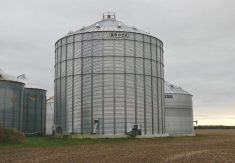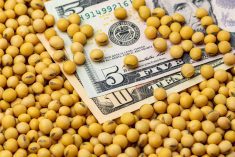Buenos Aires | Reuters — Argentina’s main state bank will deny credit to farmers who are holding onto soybeans as a hedge against inflation, a top official said on Friday, as the government cracks down on crop hoarding as part of a campaign to build up its dollar reserves.
The grains-rich but cash-poor South American country has seen its economy grind to a standstill this year while farmers, hit by high inflation, use soy as a unit of savings preferable to the local peso.
This deprives the government of much needed foreign exchange and tax revenue. To spark selling of an estimated 12.9 million tonnes, or US$4.96 billion worth of soy being held back from the market, Banco Nacion has told its branches to halt credit next year to growers who have piled beans into the long, white “silo-bags” that have come to dot the Pampas grains belt.
Read Also

U.S. grains: Soy futures pull back as Brazil harvest advances
Chicago | Reuters – U.S. soybean futures fell on Monday on profit taking after a rally last week drove prices…
If it works, the increase in supply from the world’s No. 3 source of soybeans would put downward pressure on food prices. Argentine soy is used widely as livestock feed in Asia, fueling the region’s shift toward a higher-protein diet.
“What Banco Nacion is doing is absolutely rational for a state bank dedicated to economic development,” cabinet chief Jorge Capitanich told reporters. “Our policy is aimed at helping growers who are most in need of credit, not those who could just as easily sell their surplus beans to get financing.”
Farmers are required to report their stock levels regularly.
“You have to show you have sold all your soybeans. If you have anything left, no loans,” said Santiago del Solar, a farmer in the bread basket province of Buenos Aires.
Banco Nacion finances about 40 per cent of Argentina’s total agricultural production, according to private estimates, amounting to US$300 million in credits per year to soy growers.
More soy sales by farmers would help replenish state coffers by way of currency controls that force exporters to change dollar receipts into pesos. The government also imposes a 35 per cent tax on soybean exports.
The government, which defaulted on its international bonds in July, restricts access to U.S. dollars for farmers and non-farmers alike. Soy is prized because it is priced not in pesos but in the U.S. currency.
President Cristina Fernandez has had a strained relationship with the agricultural sector since her government was shaken in 2008 by massive growers’ protests over tax policy.
— Hugh Bronstein reports for Reuters from Buenos Aires. Additional reporting for Reuters by Maximiliano Rizzi in Buenos Aires and Julie Ingwersen in Chicago.














